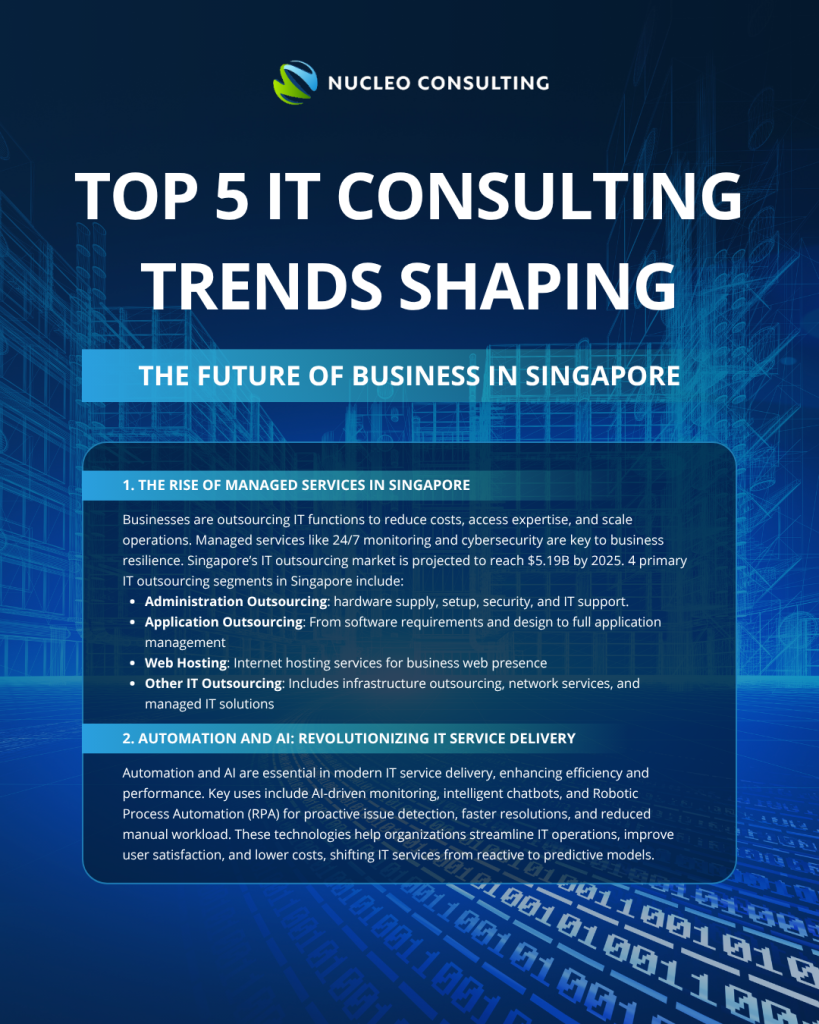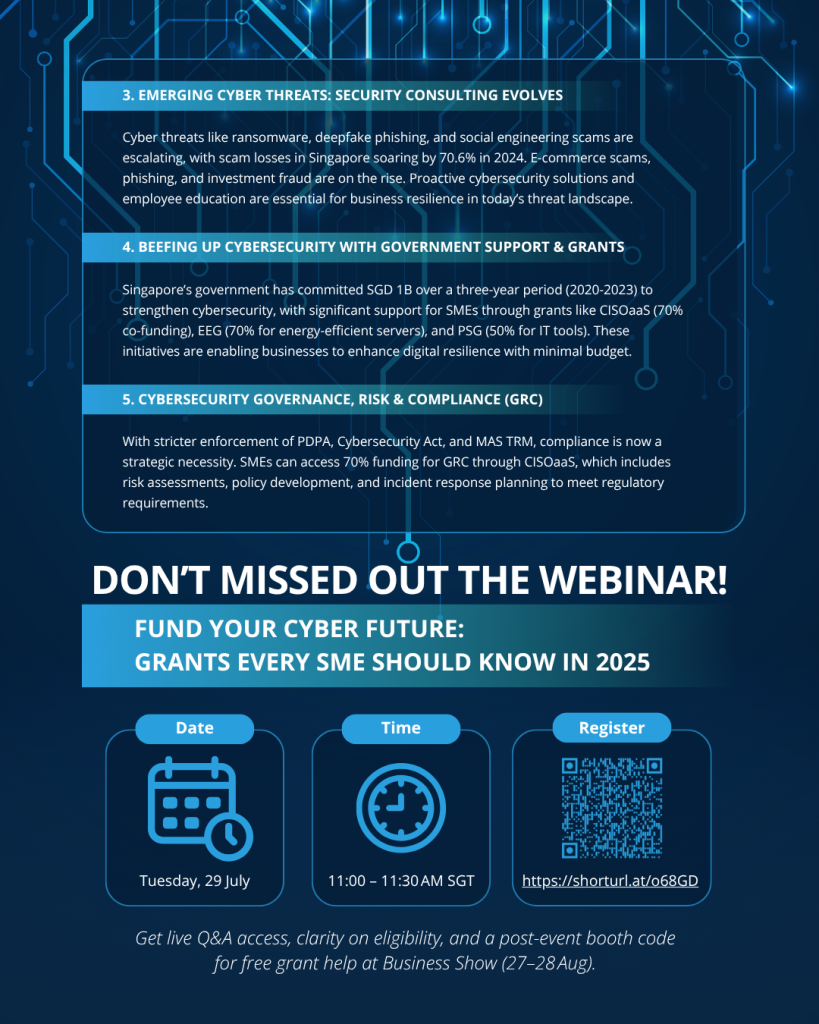Top 5 IT Consulting Trends Shaping the Future of Business in Singapore


1. The Rise of Managed Services

Trend Snapshot
Businesses across sectors are increasingly outsourcing their IT functions to reduce operational costs, tap into specialised expertise, and focus on core business growth. Managed services now offer more than just external support—they provide 24/7 monitoring, proactive maintenance, cybersecurity, and on-demand scalability.
Why It Matters
Reliable IT infrastructure has become a foundational need—not a luxury. According to Statista’s 2025 report, Singapore’s IT outsourcing market is projected to reach US$5.19 billion in revenue, reflecting how crucial outsourced IT services have become in today’s digital-first economy. This market is expected to grow at a compound annual growth rate (CAGR) of 6.58% from 2025 to 2030, hitting US$7.14 billion by 2030. Businesses that embrace managed services are not only improving efficiency, they’re better positioned for long-term resilience and innovation.
Local Context: Singapore’s Digital Surge
Post-COVID acceleration in digitalisation has amplified the demand for agile and secure IT infrastructure. Singapore’s favourable environment—characterised by a highly skilled workforce, advanced tech infrastructure, and strong government backing for digital transformation—makes it a hotbed for IT outsourcing. The country’s average IT outsourcing spend per employee is projected at US$1.39k in 2025, showing a robust commitment by local enterprises toward managed service investments.
Key industries such as finance, healthcare, and logistics, which rely heavily on secure and efficient tech systems, are driving this demand. In particular, cloud-based solutions and emerging technologies like artificial intelligence (AI) and blockchain are reshaping outsourcing needs—prompting providers to offer more tailored, forward-looking services.
Competitive Edge: Why Multinationals Choose Singapore
Singapore offers a unique advantage for multinational companies looking to outsource. Its strategic location, robust intellectual property laws, political stability, and reputation as a regional business hub make it a prime destination for global IT operations. This appeal is reflected in the presence of leading global outsourcing firms in the market, including IBM, Accenture, Capgemini, NTT, and Hewlett Packard Enterprise.
What’s Being Outsourced?
Statista’s market definition highlights four primary IT outsourcing segments in Singapore:
- Administration Outsourcing: Tasks like hardware supply, setup, security, and IT support
- Application Outsourcing: From software requirements and design to full application management
- Web Hosting: Internet hosting services for business web presence
- Other IT Outsourcing: Includes infrastructure outsourcing, network services, and managed IT solutions
These services are increasingly bundled into managed services packages that allow businesses to scale up or down based on their operational needs.
The Next Frontier
As cybersecurity threats evolve, CISO-as-a-Service is gaining traction as part of the managed services landscape. It offers organisations access to strategic security leadership without the need to hire a full-time Chief Information Security Officer. In Singapore, where cyber readiness is tightly aligned with national resilience goals, this model aligns perfectly with the demand for scalable, expert-led IT governance.
CISO-as-a-Service (CISOaaS):
- Enables SMEs without internal CISOs to access expert security leadership.
- SMEs can apply for funding of up to 70% under CSA’s Cybersecurity Health Plan for SMEs.
Read more: “Why SMEs in Singapore Need CISO‑as‑a‑Service (CISOaaS) Now”.
2. Automation and AI: Revolutionizing IT Service Delivery
Automation and AI have become essential in modern IT service delivery, transforming how IT consultancies manage technology environments.
Key uses include:
AI-driven Monitoring: Continuously analyzes network traffic and system behavior to detect anomalies early for proactive intervention.
Intelligent Chatbots: Use natural-language processing to instantly resolve common IT support issues, freeing human agents for complex tasks.
Robotic Process Automation (RPA): Automates repetitive tasks like password resets and system updates, increasing efficiency and reducing manual workload.
Benefits organizations experience include faster incident detection and resolution, fewer support tickets, and improved user satisfaction. These technologies are widely adopted across all business sizes to streamline IT operations, enhance resource use, and lower overhead costs.
Overall, AI and automation shift IT services from reactive, manual processes to predictive and efficient models, improving both technical performance and business outcomes.
Read our case study on AI-enhanced IT support—Key Lessons from 5 Cyber Attacks Every Business Should Know.
3. Emerging Cyber Threats: Security Consulting Evolves

Trend Snapshot: Cyber Threats Are Evolving—And Escalating
Cyber threats like ransomware, AI-generated deepfake phishing, and social engineering scams are no longer fringe risks—they’re now among the most urgent security challenges faced by businesses and individuals alike. In Singapore alone, scam and cybercrime cases surged by 10.8% in 2024, rising from 50,376 cases in 2023 to 55,810 cases in 2024.
The situation is even more alarming when you look at the financial impact:
- Total scam losses skyrocketed by 70.6%—from $651.8 million in 2023 to at least $1.1 billion in 2024.
- Scams alone accounted for 92.3% of all reported scam and cybercrime cases, totalling 51,501 incidents in 2024.
What’s driving this increase?
Despite efforts by government and financial institutions, scammers are becoming more sophisticated. In 2024, 82.4% of scam cases involved self-effected transfers, where victims were deceived into willingly transferring money, even though scammers never gained direct access to their bank accounts.
Another striking trend is the explosion in cryptocurrency-related scams, which accounted for 24.3% of all scam losses in 2024—up dramatically from just 6.8% in 2023.
Understanding the Threat Landscape: More Cases, Bigger Losses
While the majority (over 70%) of scam cases involved losses below $5,000, a small number of high-value incidents drove most of the financial damage:
- Scam cases involving losses of $100,000 or more made up only 3.3% of total cases—but contributed 70.8% of total scam losses.
Just four cases were responsible for $237.9 million in losses alone.
Not All Bad News: Interventions Are Making a Difference
Established in March 2022, ASCom brings together investigation, enforcement, and real-time response under one roof, allowing for faster and more coordinated actions. Since its inception, ASCom has issued advisories to more than 95,000 potential scam victims, disrupting scam operations before losses occur. Leveraging online trawling technologies and upstream intervention strategies, the unit proactively identifies scam activity and shuts it down early.
Collaboration has been a key factor in ASCom’s success. Working with over 80 financial and tech institutions, including six major banks (DBS, OCBC, UOB, SCB, HSBC, CIMB)—some of which have co-located teams within ASCom—has significantly enhanced scam response time. These partnerships have led to the seizure of over $1.5 million from scam-linked accounts, with a recovery rate exceeding 60%. In one high-profile case, a joint effort with DBS Bank resulted in the recovery of USD10 million in a ‘Business Email Compromise’ scam.
Efforts by the Anti-Scam Command (ASCom) and its partners are seeing some success:
- $182 million in scam losses were recovered in 2024.
- Another $483 million in potential losses were prevented through early intervention with potential victims.
There were also notable decreases in scam types such as fake friend calls, malware-enabled scams, and social media impersonation, attributed to preventive measures implemented by banks, telcos, and regulators.
However, other scam types are on the rise, including:
- E-commerce scams
- Phishing attacks
- Investment fraud
- Government official impersonation scam
Cyber Resilience Is a Business Imperative
The rising tide of cyber threats is affecting organisations of all sizes and industries. As attacks grow more sophisticated, many businesses struggle to keep pace—exposing themselves to data breaches, financial losses, and reputational damage.
To stay ahead, it’s no longer enough to react after the fact. Proactive cybersecurity measures are essential. This includes:
- Threat intelligence and continuous monitoring to stay informed of evolving risks
- Penetration testing and vulnerability assessments to identify and fix weak points before they’re exploited
- Employee training and phishing simulations to reduce human error and improve cyber hygiene
- Incident response planning to ensure rapid containment and recovery when breaches occur
While outcomes vary, organisations that implement a multi-layered cybersecurity strategy often experience faster threat detection, reduced response times, and improved business continuity. The long-term cost savings from preventing or minimising incidents can be substantial.
Investing in cyber resilience today helps ensure operational stability and protects the trust you’ve built with clients, partners, and stakeholders.
Read more : How CISO-as-a-Service Can Transform Your Cybersecurity Strategy Learn how SMEs are getting targeted in our article “Think Your Business is Too Small for a Cyber Attack? Think Again”.
4. Beefing Up Cybersecurity with Government Support & Grants
Trend Snapshot: Cybersecurity spending is rising as businesses increasingly tap into government incentives—especially SMEs—to protect against escalating cyber threats. This national push for digital resilience is not without substantial backing.
The Singaporean government committed SGD 1 billion over a three-year period (2020–2023) to strengthen its cyber and data security systems, part of a national strategy to support the country’s digital economy and Smart Nation ambitions. This investment reflects a broader, long-term approach that includes key milestones such as the establishment of the Cyber Security Agency (CSA) in 2015, the enactment of the Cybersecurity Act in 2018, and the Personal Data Protection Act in 2012, all designed to bolster digital trust and resilience. The initiative also underscores the need for collective vigilance, with government, businesses, and individuals sharing responsibility in mitigating growing cyber threats.
This investment supports a wide range of public sector agencies as they adopt transformative technologies like cloud computing, artificial intelligence (AI), and the Internet of Things (IoT)—all of which inherently expand the potential attack surface.
This funding not only enhances national digital defence, but also lays the groundwork for private sector enablement, through initiatives such as:
- Cybersecurity toolkits and baseline assessments for SMEs
- Co-funding schemes for cybersecurity solutions under the Productivity Solutions Grant (PSG)
- Capability-building programmes led by CSA (Cyber Security Agency of Singapore)
By aligning policy, investment, and innovation, Singapore is positioning itself as a regional leader in cyber readiness, with both public and private sectors actively contributing to a more secure digital ecosystem.
Grant insights:
- CISOaaS: Eligible SMEs get 70% co-funding for cybersecurity health plans via CSA & IMDA.
- Energy Efficiency Grant (EEG): Up to 70% support, capped at S$30K, for energy-efficient servers and infrastructure—extended through March 2026.
- Productivity Solutions Grant (PSG): 50% support (cap S$30K) for pre-approved IT tools, including cybersecurity suites.
SME playbook:
- Start with a Cybersecurity Health Check—it aligns your posture to national standards and benchmarks performance.
- Develop a Cybersecurity Health Plan via CISOaaS (co-funded).
- Boost your infrastructure with EEG-backed investments (e.g., energy-efficient servers).
- Add cybersecurity tools via PSG.
Webinar Hook:
Join our webinar “Fund Your Cyber Future: Grants Every SME Should Know in 2025” (29 July, 11.00-11.30AM SGT) to walk through grants, funding applications, and SME success stories. Learn how to:
- Tap CISOaaS and EEG funding
- Upgrade cybersecurity with minimal budget
- Access a special code at Sands Expo 27–28 Aug (#732) for free grant assistance post-webinar
5. Cybersecurity Governance, Risk & Compliance (GRC)
Trend Snapshot: With tighter enforcement of PDPA, Cybersecurity Act, and MAS TRM, compliance is no longer optional—it’s strategic.
Consultant role:
- Conduct risk assessments aligned to core objectives
- Develop policies and procedures tailored to regulations
- Run compliance audits, identify gaps
- Prepare incident response plans and ensure regulatory notification readiness
Support method:
- GRC guidance often bundled in CISOaaS
- 70% funding for GRC scopes under CISOaaS health plans
For more: “How CISO‑as‑a‑Service Can Transform Your Cybersecurity Strategy”.
How SMEs Can Act Now
- Start fast with the 10-min CSA Cybersecurity Health Check
- Sign up for CISOaaS to get a customized health plan & potentially 70% funding
- Apply EEG to fund servers/infrastructure meanwhile reducing energy & carbon
- Use PSG to access efficient cybersecurity tools
- Align security roadmap with GRC – PDPA, Cybersecurity Act, MAS guidelines
Webinar Details – Don’t Miss Out!
Fund Your Cyber Future: Grants Every SME Should Know in 2025
- Date: Tuesday, 29 July
- Time: 11.00-11.30AM SGT
- Register here: [Eventbrite link]
Get live Q&A access, clarity on eligibility, and a post-event booth code for free grant help at Business Show (27–28 Aug).
Summary
Singapore SMEs are seizing the moment: tapping managed services, AI innovations, proactive cybersecurity, and comprehensive GRC—all supported by robust government grants (70% CISOaaS, 70% EEG, 50% PSG).
The result? Resilient, compliant, cost-effective IT operations—just what you need in 2025’s challenging market. Register now and transform your IT with expert strategy and government assistance!
ITConsulting | SingaporeSME | CyberSecSG | CISOaaS | AIinIT | ManagedServices | PDPA | ITGrants | GovTechSG | FutureProof
